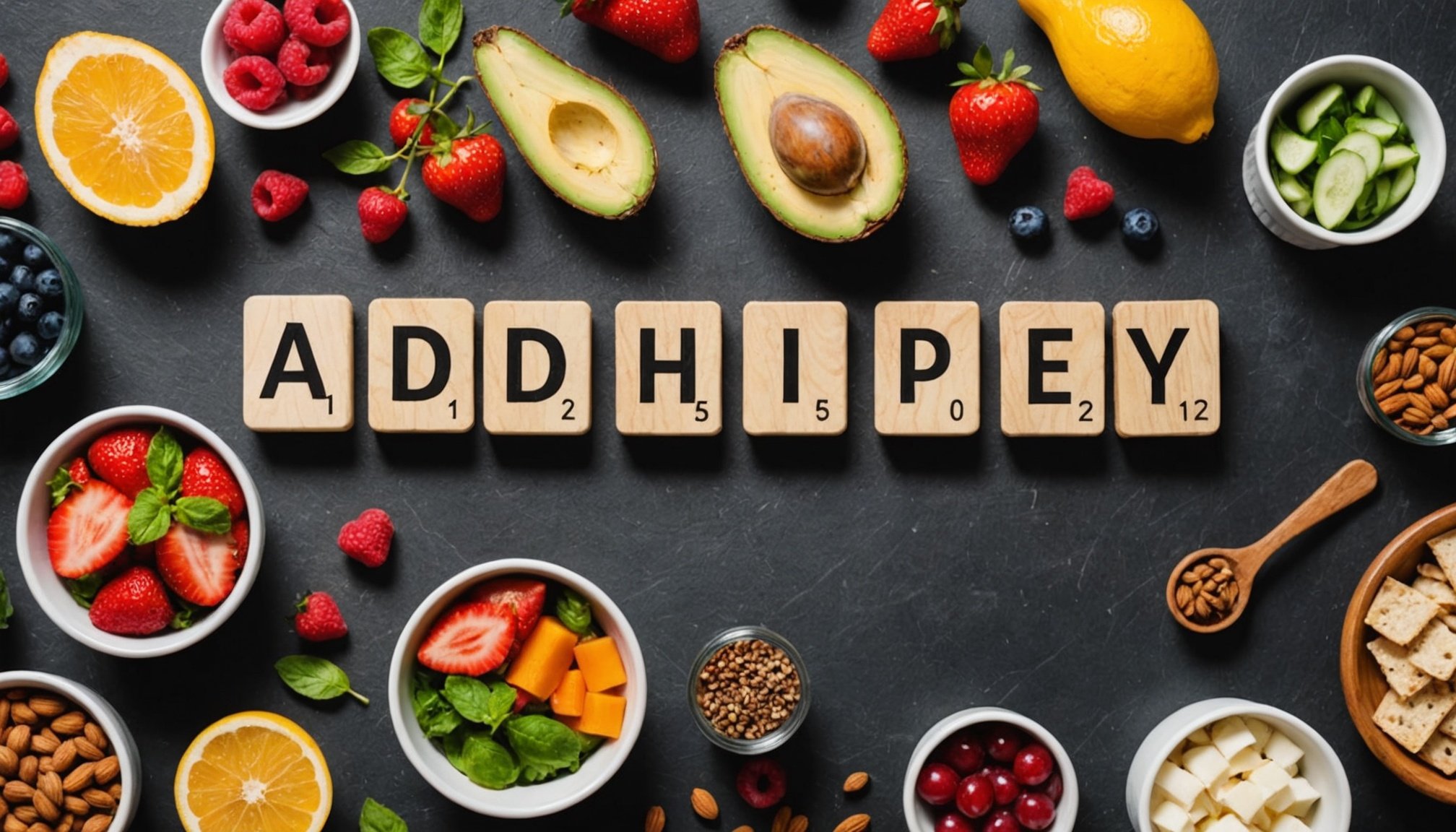Understanding ADHD and Dietary Influence
ADHD, or Attention-Deficit/Hyperactivity Disorder, presents a range of symptoms such as inattention, impulsivity, and hyperactivity. The management of these symptoms can often pose significant challenges for those affected. Recent research suggests a noticeable connection between nutrition and ADHD. This connection underscores the pivotal role of nutrition in ADHD management, particularly in relation to neurological health.
Overview of Symptoms and Challenges
Individuals with ADHD experience varying degrees of difficulty in focusing, following instructions, and staying organized. While medication remains a primary treatment, there is growing interest in how ADHD dietary management can serve as a complementary approach.
Also read : Exploring the Impact of Fermented Foods on Mental Wellbeing: A Path to Better Mental Health?
Nutrition’s Impact on Neurological Health
Nutritional choices directly influence brain health, significantly affecting behavior and cognitive function. There is substantial evidence indicating that dietary modifications can help manage ADHD symptoms. Enhancing nutrient intake, such as Omega-3 fatty acids, can support neurotransmitter function and improve concentration and mood regulation.
Evidence for Dietary Changes
Studies have shown that strategic dietary changes can alleviate ADHD symptoms. Nutrition and ADHD research highlights the effectiveness of interventions such as increased protein consumption for improved cognitive function and attention span. Recognizing the role of a balanced diet can lead to more personalized and effective management strategies.
Also to discover : Exploring the Impact of Peer Mentoring on Lowering Relapse Rates in Substance Abuse Recovery
Dietary Approaches for ADHD Management
Exploring dietary strategies for ADHD can offer valuable insights for symptom management. Various nutrition-based interventions have gained attention, including specially tailored diets and supplements that enhance daily nutrient intake. These approaches aim to mitigate ADHD symptoms by addressing potential nutritional deficiencies.
Overview of Dietary Approaches
Dietary strategies frequently recommended involve adjusting one’s overall dietary patterns. Emphasis is placed on integrating whole foods rich in essential nutrients. Notably, the incorporation of Omega-3 fatty acids, zinc, magnesium, and protein is often suggested to bolster cognitive function and behavioural stability. These nutrients play a crucial role in supporting neurotransmitter efficiency and overall brain health.
Elimination Diets
Elimination diets focus on removing potential dietary triggers that may exacerbate ADHD symptoms. Common targets include artificial additives, such as dyes and preservatives, as well as allergens like gluten and dairy. The primary goal is to identify and reduce exposure to these potential irritants, thereby alleviating issues related to behavioural and cognitive disturbances.
Supplementation and Nutrient Focus
In cases where diet alone may fall short, supplementation becomes a viable option. Supplements enriching Omega-3, zinc, and magnesium levels can fill gaps, helping to fine-tune neural processes. While beneficial for many, it’s essential for individuals considering this path to consult healthcare professionals to ensure balanced and safe supplementation.
Research-Based Insights
Understanding the intricate relationship between diet and ADHD is critical for effective symptom management. ADHD studies have extensively explored how dietary adjustments can mitigate symptoms. Scientific findings consistently highlight the role of specific nutrients like Omega-3 fatty acids, zinc, and magnesium in supporting neurological health. These nutrients aid in neurotransmitter function, which is vital for improving attention and reducing hyperactivity.
Several dietary research ADHD projects underscore the mixed responses in individuals to dietary changes. While many experience significant improvements in focus and behaviour, others may exhibit no change, emphasizing the need for personalized strategies. Varied responses are attributed to genetic predispositions, lifestyle differences, and adherence levels to dietary protocols.
Key studies reveal that whole foods, rich in these nutrients, contribute positively to symptom management. The detailed examination of these research findings provides a foundation for developing individualized nutrition plans, making informed dietary choices, and fostering sustained improvements in cognitive and emotional regulation. These insights serve not only as a guide for optimal nutrition but also as a testament to the power of diet in managing ADHD.
Practical Tips for Implementing Dietary Changes
Successfully implementing dietary changes tips for managing ADHD symptoms requires thoughtful ADHD meal planning and practical nutrition advice. Integrating new foods need not be daunting. Start by gradually incorporating nutrient-rich options like fruits, vegetables, and whole grains into meals. Prioritize Omega-3-rich foods such as salmon and walnuts.
When rethinking meal planning, consider batch cooking. Preparing meals in advance saves time and reduces stress. Utilize weekends or less hectic days to cook larger portions, storing them for easy access throughout the week. This approach supports a balanced diet even in busy lifestyles.
Incorporating family involvement can be crucial for sustainable changes. Encouraging participation in meal preparation fosters a supportive environment, aiding consistent dietary habits. Explain the benefits of healthy nutrition, making the changes a shared family goal.
Lastly, routinely discuss experiences and challenges with family members. Open communication ensures everyone is comfortable with the new meals and identifies areas needing adjustment. Such strategies, paired with professional guidance, pave the way for effective dietary transitions in managing ADHD.
Success Stories and Testimonials
Exploring real-life ADHD success stories reveals how dietary changes can positively impact individuals. Many have shared their personal experiences, highlighting significant improvements in focus, mood stability, and overall symptom management. These firsthand accounts serve to inspire and educate others in exploring dietary paths.
Common themes across these testimonials include the adoption of nutrition-based interventions, such as increased Omega-3 intake and elimination diets targeting potential triggers. Individuals often report enhanced cognitive clarity and emotional balance, aligning with broader scientific research on nutrition and ADHD. In addition, some experienced marked improvements in behavioral regulation and executive function.
Celebrating such dietary impact illustrates the power of personalized approaches. Individuals have successfully tailored their diets to address specific needs, showing the versatility and potential of dietary management in ADHD care. These stories not only validate the role of nutrition but also encourage a proactive exploration of holistic management strategies. Tailoring dietary plans to personal needs is crucial, as each success underscores the importance of individual variability in response to nutrition-based interventions.
Potential Pitfalls and Considerations
Navigating the path of dietary management for ADHD can sometimes pose challenges. Among common pitfalls is encountering dietary pitfalls ADHD when transitioning to new nutrition plans. The body might require time to adjust, leading to initial discomfort or mild symptoms. This underscores the significance of maintaining patience and perseverance.
Individual variability plays a pivotal role. Each person’s response to dietary changes may differ significantly, influenced by genetics and lifestyle factors. Such variability necessitates personalized approaches to ensure effectiveness in symptom management.
Professional guidance, therefore, becomes indispensable. Consulting with experts ensures that dietary adjustments are grounded in sound advice and that changes are safe and beneficial. They can provide tailored recommendations, addressing unique nutritional needs and avoiding common pitfalls.
Finally, family support remains crucial during this transitional phase. Open dialogue about challenges fosters understanding and eases adjustment. Engagement from loved ones can bolster commitment to nutrition-based interventions, facilitating smoother adjustments and reinforcing positive behavioral changes, ultimately leading to more successful ADHD nutritional management.
Expert Opinions and Recommendations
Navigating ADHD dietary management can be enriched by incorporating expert advice ADHD specialists provide, which aligns closely with evolving research. Insights from nutritionists emphasize the critical interplay between nutrition and mental health, highlighting that dietary choices profoundly impact cognitive functions and emotional regulation. ADHD specialists recommend personalized strategies, suggesting that customization can optimize symptom management.
ADHD experts recommend resources like the “ADHD and Nutrition Guide” to foster informed choices. Such materials facilitate understanding the intricate relationship between nutrition and ADHD, offering practical advice. Fostering a collaborative approach, involving healthcare professionals ensures dietary interventions are both effective and safe.
The importance of a tailored approach cannot be understated. Each individual’s unique physiology and lifestyle require specific adaptations, making a one-size-fits-all strategy ineffective. Nutrition and mental health experts stress the need for continuous reassessment of dietary plans to suit changing needs over time. Engaging with knowledgeable professionals provides reassurance that dietary changes are beneficial and rooted in scientific evidence. This collaboration is key in achieving sustainable and meaningful improvements in ADHD symptom management, illustrating the importance of professional guidance in navigating the complexities of dietary interventions.
Visual Aids and Recipes
Integrating visual aids and ADHD recipes can simplify dietary transitions, making daily meal planning more effective. Simple, delicious recipes focused on nutrient-rich foods like Omega-3 sources (e.g., salmon) and whole grains serve as accessible options for those managing ADHD. These meals not only support cognitive function but also improve emotional regulation and focus.
Implementing visual dietary guides can further enhance understanding. Charts detailing foods high in zinc, magnesium, and Omega-3s provide a reference tool, aiding in the selection of balanced meals. Such guides can highlight key nutrients vital for ADHD symptom management, empowering individuals to make informed choices.
Creating meals that are both nutritious and visually appealing encourages consistent adherence to dietary protocols. Succinct tutorials on meal preparation techniques like batch cooking streamline the cooking process, ensuring nutritious meals are readily available even during busy periods. This approach supports nutrition-based interventions, reinforcing the management of ADHD symptoms through diet.
For variety, explore colorful salads rich in leafy greens and nuts, or energy-boosting snacks incorporating seeds and fruits. By following these culinary strategies, maintaining a visually appealing and balanced diet becomes more achievable, promoting sustained adherence to dietary goals.
FAQ Section
Addressing ADHD FAQs allows individuals to explore potential solutions for dietary guidance. A common question is, “Does diet really affect ADHD symptoms?” Based on research, diet can significantly impact ADHD due to its influence on brain function. Nutrients like Omega-3 fatty acids are crucial for optimal brain health, aiding in attention and mood regulation.
Another frequent query is, “What foods should be avoided to manage ADHD symptoms?” Foods high in artificial additives, such as processed snacks and sugary beverages, can exacerbate symptoms. Opting for whole foods supports better ADHD symptom management.
People often wonder, “How long before dietary changes show effects?” While individual variability means time frames differ, noticeable improvements typically appear within a few weeks. Consistent nutrition-based interventions play a critical role in producing sustainable results.
Misconceptions regarding diet’s impact on ADHD often emerge, with doubts about the effectiveness of dietary adjustments. However, studies strongly support their capacity to complement traditional treatments. Resources and professional guidance can aid in crafting a personalized dietary plan tailored to individual needs. For further assistance, seeking advice from professionals ensures dietary modifications promote enhanced cognitive function and overall well-being.











